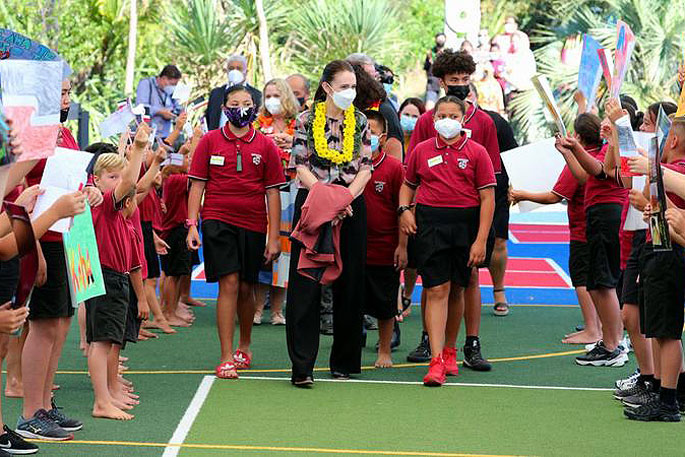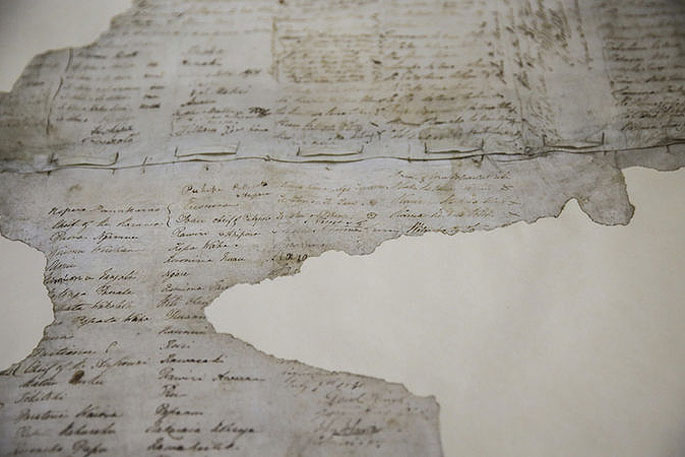Putting New Zealand's own history of the centre of the country's schooling is is the sign of a mature society and will help address inequities, educators say.
The government has published the final version of the subject curriculum for Aotearoa New Zealand's histories and Te Takanga o Te Wā, which will be compulsory in every school up to year 10.
Launching the curriculum yesterday, Prime Minister Jacinda Ardern said it gave New Zealanders a "better understanding of one another, through learning more about Māori, about the migrant history of Pasifika, our Asian communities."
It has stirred up debate in Parliament, where ACT deputy leader Brooke van Velden says it focuses too much on colonisation and dividing people into villains and victims.
The curriculum ignored scientific and technological advances and the women's movement, things that New Zealand could be proud of, she says.
"Instead this history curriculum is all about colonisations and two sets of people, Māori and Pākehā, it doesn't actually talk about the beauty of New Zealand history and the fact that we are a multi ethnic society.
"We need to make sure that we are raising our children to make sure that they are empowered to live in a society where everybody is learning about all aspects of New Zealand's history curriculum."
 Prime Minister Jacinda Ardern launched the Aotearoa New Zealand histories curriculum at Sylvia Park School on Thursday. Photo: RNZ / Nick Munro.
Prime Minister Jacinda Ardern launched the Aotearoa New Zealand histories curriculum at Sylvia Park School on Thursday. Photo: RNZ / Nick Munro.Green Party co-leader James Shaw told MPs it's vital to acknowledge New Zealand was built on notions of imperialism and xenophobia.
"One of the ways that you empower people is by being honest about the past ... and that is actually how you start to be able to think about the future," Shaw says.
"If Brooke wants to talk about other ethnicities, let's talk about the first waves of Chinese settlers who were absolutely the targets of xenophobia and were treated appallingly by Pākehā settlers, in fact only got an apology for that in the last 20 years.
"It was not a pleasant history and I think it is very important that we are honest about it and just say look this is what happened, what this is what took place, and there are consequences that we feel today for that, particularly for Māori."
'Sleepwalking'
Victoria University history professor Charlotte Macdonald says it's a sign of a mature society to "put our own history to the centre of our schooling".
"It's kind of like sleepwalking if we don't know our histories whether it's as individuals, as communities, families, communities or as a national society, then we are walking blind, both in the present and into the future.
Rather than a "victims and villains" view of history there were broad-ranging themes - as well as a lot of scope for schools to explore how history played out in their local area, she says.
"It might might be who signed the women's suffrage petition in 1893 in Hokitika or in South Dunedin or in Dargaville ... all of those events can be explored."
Te Akatea, the Māori Principals Association, says the curriculum had the potential to transform education and society.
"It's about understanding an accurate historical narrative of how we all got here here in Aotearoa, and that if we knew the accurate narrative of how we all got here, then we'd be more likely to think, speak, and teach in decolonising and honourable ways, and I say honourable ways in terms of Te Tiriti as a foundation," says association president Bruce Jepsen.
"I think we always find space for things that we value. If we're talking about transforming New Zealand education to address those inequities that have been generated by the previous curriculum, this is our opportunity.
"If we do this job properly then we're going to end up with a fantastic society here in New Zealand."
Jepsen says his school has been forming relationships with local iwi and integrating localised history into the curriculum.
The new curriculum was officially announced last February, following up on a pledge in September 2019 that history would be compulsory in all New Zealand schools.
The government finished consultation over the curriculum in June, with teachers saying it would help close "woeful" knowledge gaps on the country's past.
That was after criticism by an expert panel which found the draft curriculum failed to include topics like women, labour and economics, and the 600 years of pre-colonial Māori life.
The changes are part of the government's attempt to make it clearer what children will be expected to know in each subject, with reworks of the English, maths and science curriculums expected to follow over the next four years.



4 comments
Politics
Posted on 19-03-2022 08:38 | By Kancho
Interesting how education has become a political football not about finding but about narrative. I feel the label of villains and victims may in fact have some sway as history is a mix of fact opinion , bias and interpretation. Hopefully more important subjects won't be dumbed down as jobs rely far more on communication , maths, science being the employment skills to a more productive future. First to get attendance up for all kids as low decile schools have appalling regular non attendance stats . Education is a most vital factor to bring down unemployment and poverty. Kids are currently leaving schools with little prospects as skill levels are bad on even the basics .
Mature society?!
Posted on 19-03-2022 11:05 | By Slim Shady
Is that why New Zealand seems to relish St.Patrick’s Day and dress up as Leprechauns even if the vast majority have no Irish connection whatsoever? I though cultural misappropriation was a big no no. Certainly, New Zealand doesn’t like other countries doing the Haka and sticking their tongue out. So why are Kiwis dressing up as Leprechauns? Or celebrating other people’s history? Same with Guy Fawkes. Cultural misappropriation is a sign of an immature society.
History...
Posted on 19-03-2022 12:23 | By morepork
...Needs to be factual, balanced, and unbiased. What happened, and discussion as to why it happened. Kiwis have a record of achievement on the World stage, from the first man to split the atom, to possibly the greatest Diva that Opera has ever seen. There are NZers in key positions all around the world. Our little country punches way above its weight. But a bitter Government with a chip on its shoulder wants only to justify the move away from Democracy by focusing on the injustices of the past. We are multi-cultural and all of that diversity has a right to being recognized by kids in our schools. It isn't about heroes and villains; it's about a melting pot that brings the best of many cultures to a table and calls it "Kiwi". What comes out is a unique culture with unique individuals.
@Slim Shady
Posted on 19-03-2022 12:33 | By morepork
We relish St Patrick's Day because we share an affinity with the Irish to drink a lot and have a good time. (Some of us have strong Irish connections, also...) The haka is part of a "religion" and therefore deserves respect. Nobody minds people doing it, if it is done with that respect and cultural sensitivity. (There could be some people who object if a license fee is not paid...) Guy Fawkes has been almost eliminated by Political Correctness and will be dropped within the next decade or so. Most of the European population of NZ came from England, so they have as much right to observe it as you do. It ISN'T "cultural misappropriation" it is a diverse culture reflecting some of the roots of its diversity.
Leave a Comment
You must be logged in to make a comment.